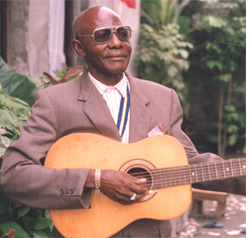|
 Wendo (Kolosoyi, Antoine), pioneer Congolese singer, song writer, and guitarist; born Mushie, Congo-Kinshasa, 1925; died Kinshasa, July 28, 2008. Wendo (Kolosoyi, Antoine), pioneer Congolese singer, song writer, and guitarist; born Mushie, Congo-Kinshasa, 1925; died Kinshasa, July 28, 2008.
Wendo is a link between the old and the new of Congolese popular music. Working as a mechanic on the river boats of the old Belgian Congo, he paused in each port to entertain the locals, singing his songs about everyday life while accompanying himself on the guitar. In Léopoldville (today's Kinshasa), during the years of World War II, Wendo formed a vocal group called Victoria Kin that emulated the band Victoria Brazza led by the great Paul Kamba of Congo-Brazzaville.
After the war, Wendo recorded several 78s for the Belgium-based Olympia record label on Olympia's portable direct-to-disc machine. Around 1949, he met another singer-guitarist named Henri Bowane who had already auditioned for the owner of Léopoldville's new Ngoma recording studio. Bowane introduced Wendo to Ngoma where the two musicians recorded "Marie-Louise." Jointly composed by the pair, with Wendo doing most of the singing and Bowane playing guitar, "Marie-Louise" told of Wendo's love for a woman whose father disapproved. The catchy melody and telling lyrics produced the fledgling recording industry's first hit. Wendo and Bowane soon parted company, but Wendo continued to record at Ngoma and became one of the era's biggest stars.
As the fifties rolled along, electric guitars replaced the old acoustic models, and bands overtook solo artists in popularity. The Congolese rumba was developing full tilt, rendering the likes of Wendo passé. Wendo electrified his guitar and mocked talk of his death with another hit record in 1953, "Bakosi Liwa ya Wendo." He toured the provinces with other Ngoma stars, Léon Bukasa and Manuel D'Oliveira, as the Trio BOW and even updated "Marie-Louise" by re-recording it as a cha-cha with the Begun Band.
With Congolese independence in 1960 and its accompanying civil strife, Léopoldville's recording studios closed, and Wendo faded from sight. He re-surfaced briefly with Tabu Ley's band in the mid-sixties. In 1973 he re-recorded some of his songs for a cultural preservation project. The following year he performed at the Zaire 74 music festival, staged in conjunction with the Muhammad Ali-George Foreman boxing match being held in Kinshasa. Congo-Brazzaville honored him in 1982, and in 1987 he was inducted into the National Order of the Leopard, at the time Congo-Kinshasa's (Zaire) highest award.
Wendo's resurgence began with the filming of a 1992 documentary on his life by Belgium-based film maker Mirko Popovitch. The Film, Tango ya ba Wendo (the time of Wendo) and a newly recorded CD, Nani Akolela Wendo? (Who will cry for Wendo?), re-introduced the sixty-six year-old singer. A 1999 appearance at a music festival in Abidjan resulted in the new CD Marie-Louise. In 2000, his seventy-fifth year, Wendo played a dozen concerts in the U.S. and Canada. Amba, an exceptional CD released in 2002, proved to be his last.
Wendo remains one of Congolese music's most revered figures. Born before the music's better-known stars, he managed to outlive most of them. His pioneering recordings helped open the gates for the astonishing outpouring of music that eventually swept him aside. His surprising eleventh-hour renaissance capped a long and remarkable career.
© 2011 Gary Stewart
SELECT DISCOGRAPHY
Ngoma, the Early Years 1948-1960 (Popular African Music PAMAP101) reissue 1996; Bankolo Miziki, Les Pioneers (vols. 1 & 2, Ngoyarto NG047 & 048) 1973 re-recordings of earlier material by Wendo and others, reissued 1998; Nani Akolela Wendo? (Franc'Amour FC075) 1993; Marie-Louise (Indigo LBLC2561) 2000; Amba (Marabi 46 801-2) 2002.
SELECT BIBLIOGRAPHY
M. Lonoh, Essai de commentaire sur la musique congolaise moderne (Kinshasa, 1969); S. Bemba, 50 ans de musique du Congo-Zaire (Paris, 1984); C. Stapleton & C. May, African All-Stars (London, 1987); M. Sinnock, "The Kinshasa Social Club," The Beat, (vol. 19, no. 2, 2000); G. Stewart, Rumba on the River (London and New York, 2000).
|

